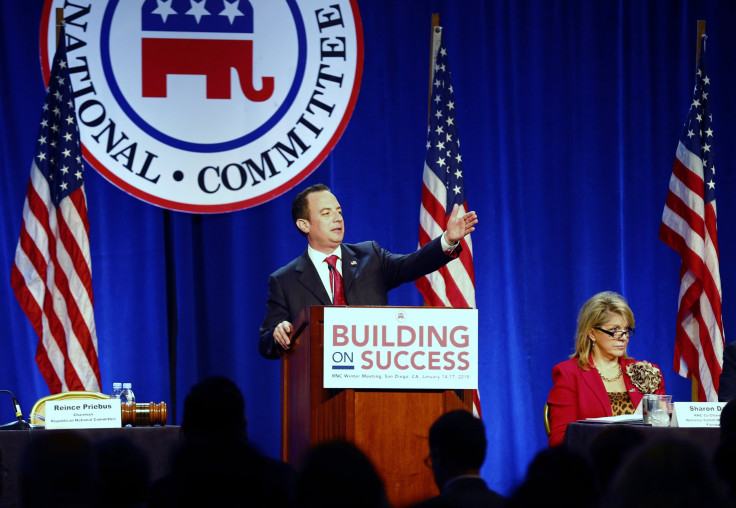Election 2016: GOP Announces Fewer Debates

WASHINGTON -- The Republican Party is getting a grip on the number of primary debates for the 2016 election after many complaints in 2012 that the schedule had gotten out of control. On Friday, the GOP officially sanctioned nine debates for the primary, a sharp decrease from the 20 held in the lead-up to 2012.
The first debate won’t be held until this August, giving candidates more time to mull a run and jump into the fray. Conversely, the schedule could prevent candidates who are less well-known from building support through the national exposure of debates.
“The 2016 cycle is underway, and I can tell you it will be a landmark election for Republicans,” Republican National Committee Chairman Reince Priebus said. “By constructing and instituting a sound debate process, it will allow candidates to bring their ideas and vision to Americans in a timely and efficient way. This schedule ensures we will have a robust discussion among our candidates while also allowing the candidates to focus their time engaging with Republican voters.”
The large number of 2012 debates was blamed for the inability of the party to quickly coalesce around a single candidate. The GOP also lamented the number of gaffes that came out of the debate process, like Rick Perry’s famous inability to name which cabinet departments he wanted to eliminate or Mitt Romney saying illegal immigrants would “self deport.”
The list of debates the RNC announced Friday includes broadcast partners to carry the events on television. But they emphasized they would be working to partner the networks with conservative media outlets and conservative panelists to ask questions. The RNC also left an option for a 10th debate that would be hosted by a conservative media outlet and potentially two more in March 2016 if the primary is still competitive.
This answers a criticism from the 2012 cycle, in which conservatives argued that debates were being driven by the “liberal media” and didn’t focus on conservative issues. Instead of asking about birth control or immigration, conservatives wanted more opportunities for the candidates to discuss issues that appeal to the right.
The final debate sanctioned for the primary will be conducted by NBC and Telemundo, the Spanish-language network based in Florida. Last cycle, Telemundo didn’t get to host a debate. Missing from the new schedule? Unlike last time, MSNBC won’t get a chance to run a GOP primary debate.
"We just can`t have MSNBC, you know, hosting a debate at the Reagan Library only to have their network comment -- you know, make the commentary afterwards for three hours about the debate of the Republican Party," Priebus said in 2012. "I mean, it’s ridiculous."
Few in 2012 disagreed that the debate schedule had gotten a little out of hand. In the days before the New Hampshire primary, the GOP candidates participated in two debates in two days. And on top of that, many candidates participated in forums, which functioned like debates but only featured one candidate at a time. The GOP is taking on forums, but they have put in place rules so that each state only gets one debate. And that means they won’t be concentrated in the early primary states as in years past. Ohio gets the first debate and California the second. Candidates will travel to swing states Colorado, Wisconsin and Nevada before holding debates in the early primary states.
But with such a large crowd running again on the Republican side of the ballot, the candidates will surely be looking for ways to break through to voters. And if they don’t have debates, they will have to find other ways.
Priebus acknowledged that it’s a big crowd. "It is exciting that Republicans will have such a large bench of candidates to choose from, and the sanctioned debate process ensures voters will have a chance to hear from them,” he said. “The American people are tired of President Obama’s policies, and I am confident the debate process will enable candidates to communicate their ideas and ultimately help us elect a Republican president in 2016 to get our country back on track.”
© Copyright IBTimes 2024. All rights reserved.





















